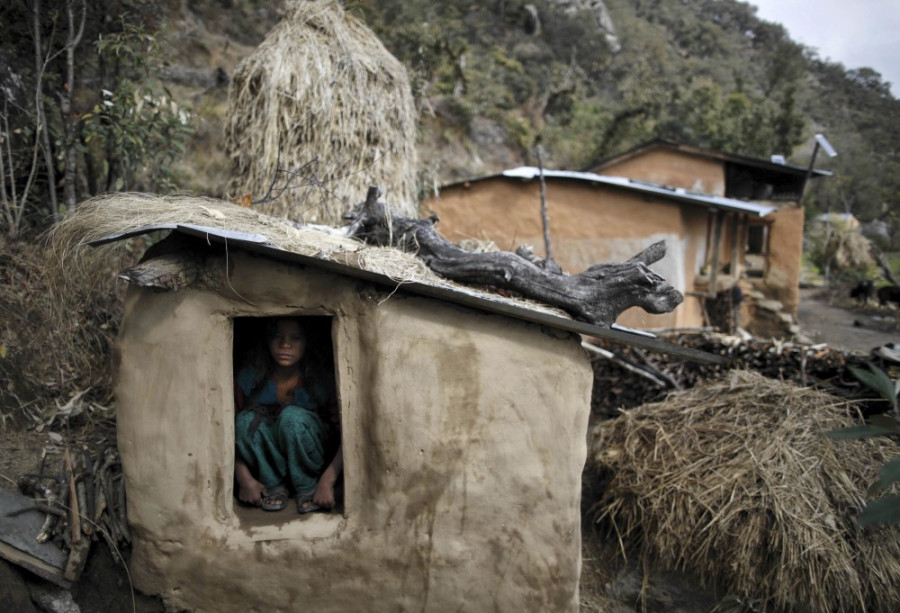Columns
In the case of menstruation, tradition defies the laws
Parliament has criminalised Chhaupadi, but the practice still exists due to prevalent social norms.
Laabhesh Thapa
The ancient Hindu practice of Chhaupadi is an example of religious belief resisting the law of the land. The deeply rooted belief states that menstrual blood is impure, and women having their period should be isolated. Chhaupadi is one of the forms of seclusion the women face from society, and the social consequences of this pure-impure binary are one of the most overt forms of discrimination. This practice is localised mostly in the far western part of Nepal. The Supreme Court banned Chhaupadi in 2005, stating that it was a violation of human rights, but it is still practised.
Parliament criminalised Chhaupadi in 2017, passing the law unanimously. Despite its criminalisation, the practice still exists due to prevalent social norms. Traditional healers linked it with a tradition that has been followed for decades. Anti-Chhaupadi activists have been unable to convince people to abandon this brutal practice of forcing women to live outside the home in huts or sheds during their period. This has been the tradition for a very long time. Women subjected to the practice constantly live in fear of sexual violence, wild animals and various diseases during their stay in these huts or sheds. It is often argued that the practice has roots in Hinduism, and hence sleeping in a hut is a requirement for a woman during her period. Elders and traditional healers try to preserve this tradition stating that women who are having their period bring bad luck and are impure. Religious belief more often than not has challenged the law. The young generation in the villages of western Nepal should take the lead and reject and denounce this practice in its entirety.
Human-made practice
In Hinduism, goddesses occupy an exalted position and are worshipped but women are made to suffer because of their natural body cycle. This is a human-made practice which can be abolished with the joint support of the community. Women are forced to sleep alone or sometimes in groups for five to seven days every month. They are not allowed to take part in household work or enter temples. They are often forced to live with cattle during this period.
The system at the Sabarimala Temple located in the Indian state of Kerala is another example of religious belief taking precedence over the law. The Supreme Court of India gave a historic verdict granting all women of all age groups the right to enter the shrine. The court stated that a woman is not inferior to a man and that patriarchy in religion cannot be allowed to trump the right to pray and practise religion. Despite the ruling, women are not allowed to enter the sanctum sanctorum by the local community. It is believed that Lord Ayyappa, who is worshipped in the temple, is a Naishtika Brahmachari or eternal celibate, hence women of menstruating age were traditionally not allowed to enter it.
In both situations in India and Nepal, women are forced to live and perform unwanted and harmful rituals merely to impress the local deity in the name of religion and tradition. Efforts should be made to abolish these practices in their entirety. It has become the norm to follow these practices, and those who do not follow these practices are excluded from society as social deviants.
Harmonious society
The law is supposed to be a form of control over society which is created to build stability. However, in these situations, law enforcement agencies and judicial systems are ineffective when they seek to challenge tradition. Deeply rooted traditions have become a weapon for traditionalists to impose discriminatory practices on women without any fear of the law. The law and society need to go hand in hand. Unless society changes and values change, the law becomes inactive. It becomes difficult to achieve progress in society, for the nation and for the condition of women. Unless there is a change in the mentality of the people, nothing is going to change in society. Families in the villages often take pride in sending their loved ones to live in huts. It is quite strange that deities curse only women, and not men who demean their dignity.
This practice is linked to domestic violence against women in society, but women have been pressurised to accept this as a way of life. Chhaupadi remains a blot on the progressive culture of Nepal. It is very difficult to eradicate a tradition that has been practised over a long period of time. It will be a challenge for the legal fraternity to build a strong policy regarding this, and the government should work immensely hard to convince people to end this practice entirely. Strategic interventions should be held as part of an attempt to abolish Chhaupadi.
Thapa is a student at NALSAR University of Law, Hyderabad.




 22.96°C Kathmandu
22.96°C Kathmandu















